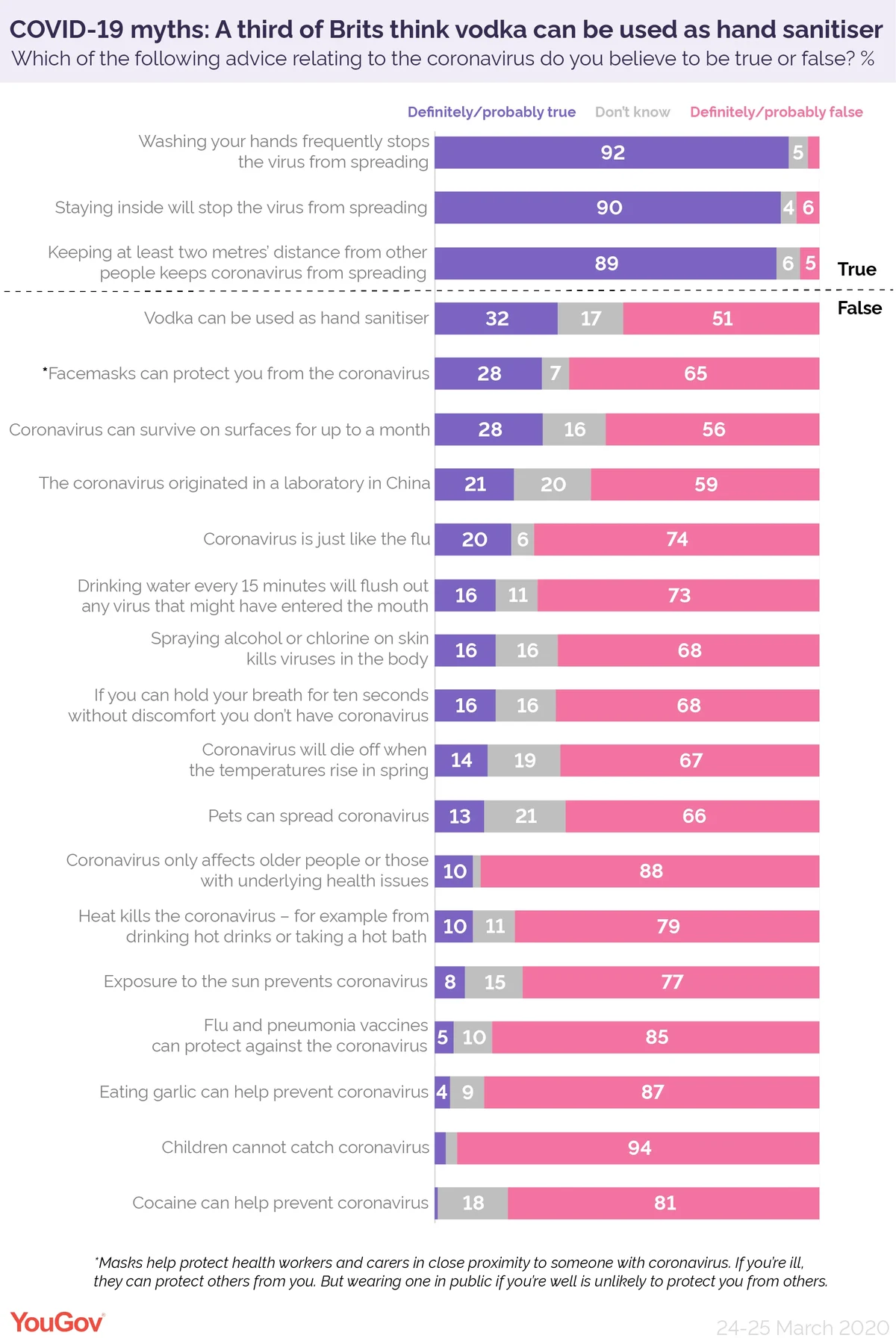A third of Brits believe vodka can be used as hand sanitiser while a fifth incorrectly think the novel coronavirus originated in a Chinese lab
New YouGov research shows that many Brits have been caught out by a flurry of hoaxes, conspiracy theories, misinformation and fake advice about coronavirus.
The most widely believed false claim is that vodka can be used as hand sanitiser; a quarter of Brits say this is probably true, and 7% believe it’s completely. In truth, there isn’t enough alcohol in vodka to effectively kill microbes.

The second most believed claim is that wearing a facemask protects you against coronavirus; just over a quarter of Brits say it’s definitely (6%) or probably (22%) true. In truth, it reduces the chances of contracting the virus if you’re spending time in close proximity to infected people. And if you have symptoms, wearing one can also protect other people. But wearing one in public if you're well is unlikely to protect you.
Nearly three in ten Brits also believe coronavirus can live on surfaces for up to a month, which is scientifically unlikely. The New England Journal of Medicine published a study recently which showed that the virus could live at most on some surfaces for up to three days.
Another common myth is that coronavirus originated in a Chinese lab. A fifth of Brits think this is the case, while another fifth are unsure. UK media has reported the story, but there is no evidence whatsoever to substantiate it.
One in seven Brits (14%) also believe that the coronavirus will ‘die off’ in spring which we are yet to find out, while 13% falsely think pets can pass on the virus.
Drinking water won’t flush out the virus
A widely shared chain message which has been circulating on social media appears to be behind a string of false advice. It claims that if you can hold your breath for 10 seconds you don’t have coronavirus. One in six Brits (16%) think this is true. A similar number also believe that drinking water every 15 minutes will flush out the virus.
The message seems to have emerged in the US with a false attribution to Stanford University, while one UK version claims to contain information that was shared only with NHS staff. It also recommends drinking hot drinks to prevent infection – advice which one in ten Brits believe is valid – and staying in the sun, believed by 8% of the public.
Men are more likely to downplay the severity of the virus
Nearly a quarter of men (24%) inaccurately believe coronavirus is ‘just like the flu’ compared with just 16% of women. In truth, the mortality rate is higher for this current pandemic than normal flu.
Similarly, men are more likely to believe that coronavirus only affects older people and those with underlying health conditions at 14% versus 8% of women. They are also less inclined to believe official Government advice such as staying inside to stop the virus from spreading, with 10% saying this is false compared with 2% of women.
The public see through claims about cocaine and raw garlic
Some of the more bizarre rumours – including that cocaine can prevent coronavirus – did not convince Brits. Only 1% of the public say it’s true, although nearly a fifth (18%) are unsure. The claim originally spread from a doctored news broadcast photograph on social media, prompting the French Ministry of Social Affairs and Health to publicly denounce the rumour.
While many social media posts also recommend eating garlic to prevent infection, only 4% of Brits believe it would make a difference. The false claim has allegedly landed a Chinese woman in hospital after she consumed 1.5 kg of raw garlic.
Photo: Getty











